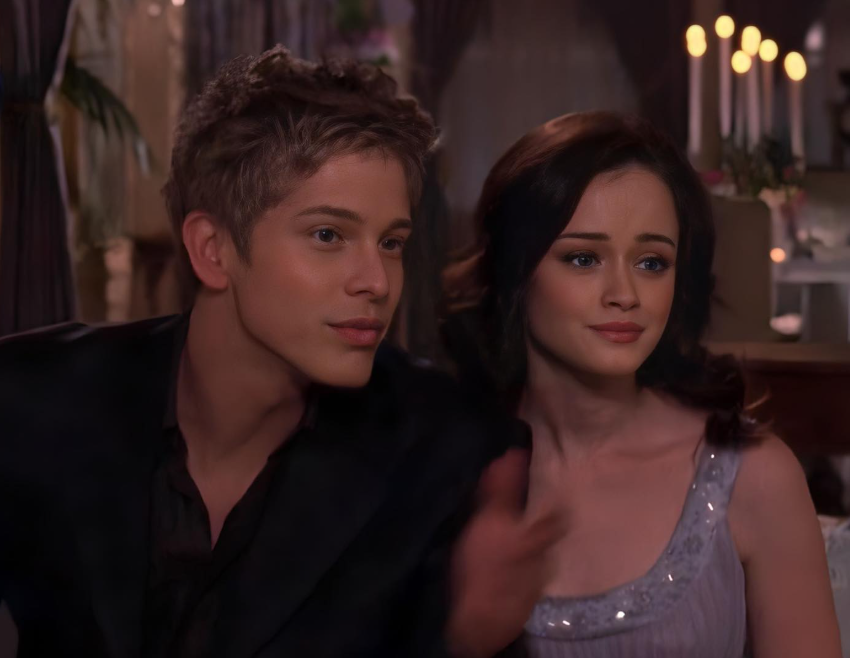Time, ambition, and the lingering weight of legacy ruined the bright ink sketch of Rory and Logan’s love story, which was never penned in pencil. Their caustic animosity at Yale turned into a passionate romance characterized by trust concerns, lifestyle conflicts, and emotional irresponsibility. Their dynamic—her a dedicated journalist-in-training, him an adventurous heir—was especially remarkable because it involved more than simply chemistry; it involved conflicting goals.

When Rory joined the enigmatic Life and Death Brigade for an investigative piece, the first indications of their relationship’s weakness appeared. Already involved in the secret organization, Logan exposed her to a luxurious, high-risk way of life that was very different from her mother’s values. By taking a symbolic leap—literally jumping off a building with Logan—Rory gave herself permission to fall emotionally as well as physically. Even yet, she could feel the difference between Logan and the person she had been brought up to be.
Relationship Timeline Table of Rory and Logan (Gilmore Girls)
| Character Name | Actor Name | First Appearance | Relationship Status | Key Event Timeline |
|---|---|---|---|---|
| Rory Gilmore | Alexis Bledel | Season 1 | Broke up in Season 7 | Met Logan in Season 5, began dating mid-season, broke up after she turned down his proposal in Season 7 |
| Logan Huntzberger | Matt Czuchry | Season 5 | Engaged to another woman in revival | Affair resumed in revival, ended before his marriage; Rory revealed she was pregnant, hinting Logan is the father |
Their relationship came to a mature and definitive crossroads by season seven. In order to provide Rory the security he believed she sought—marriage, money, and a position in his elite society—Logan proposed. However, this was an early ending to a story that was still being written for Rory, who was only graduating and still forming her identity. Her refusal was not motivated by contempt but rather by her inner compass, which was influenced in particular by Lorelai’s attitude of independence and her own desire to become a journalist.
Rory’s reluctance worked incredibly well to ground her plot as one of self-discovery as opposed to romantic reliance. She viewed the next phase of her life as a solo journey rather than a collaborative endeavor. This particular instance was representative of a larger trend in TV storytelling at the time, when female characters preferred independence to romantic resolution, as demonstrated by shows like “Sex and the City” and “Veronica Mars.” These endings were just true; they weren’t always happy or sad.
Logan gave a multi-layered emotional response. He was invested, even though he presented himself as a wealthy playboy in public. Logan exposed himself by proposing to Rory, revealing a side of himself that is rarely seen. However, after being turned down, he made the decision to completely leave, which reflected Rory’s determination. By doing this, both characters reaffirmed the notion that love, no matter how intense, does not always equate to a shared set of objectives in life.
This divorce was especially poignant because it mirrored issues of timing, identity, and sacrifice that arise in real life. Fans were split. While some viewed Rory’s choice as liberating, others thought it was impetuously cold. However, the emotional significance of that moment was undeniable. Their farewell was a silent tempest, full of finality but devoid of showmanship.
The plot takes an oddly circular turn when we jump ahead to the revival, A Year in the Life. Rory, who is now in her 30s, is having an affair with Logan, who is already engaged to someone else. Many viewers were conflicted by the moral ambiguity, yet it made psychological sense. Unresolved love frequently reappears as a mirror to reflect our growth, rather than as a source of closure.
This revival narrative developed into a multi-layered statement on adulthood, choices, and nostalgia. Despite her success and intelligence, Rory is emotionally and professionally stuck. Now that he is completely in line with his family’s expectations, Logan seems calm and collected. Their encounter had the sensation of emotional time travel rather than revived love. The story looped back to the core themes of their unresolved arc—commitment vs turmoil, family obligation versus personal truth—when Rory became pregnant, with Logan strongly hinted as the father.
The pregnancy announcement was unexpectedly subdued, yet it had a powerful emotional impact on fandom communities. Was it karma? Another chance? An ironic turn of events? Like Rory, viewers were left wondering what to do next. Would Logan ever learn? Would he mind? The rebirth reflected a tendency for ambiguity in contemporary narrative by refusing to spoon-feed conclusions.
